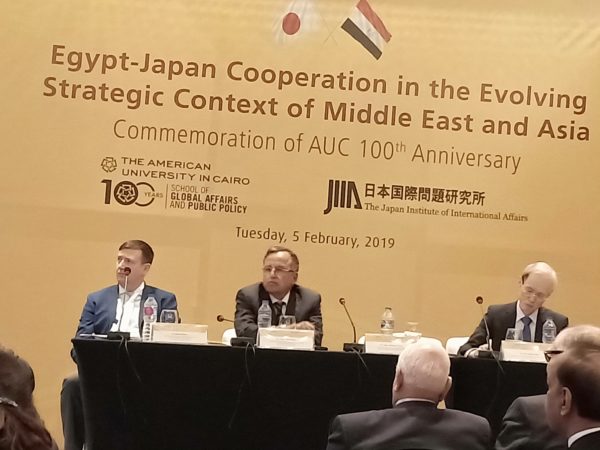
Ashraf abo Arafe
On Tuesday, February 5, 2019, the School of Global Affairs and Public Policy of the American University in Cairo (AUC) and the Japan Institute of International Affairs (JIIA), in cooperation with Embassy of Japan in Cairo, have organized a symposium titled “Egypt-Japan Cooperation in the Evolving Strategic Context of Middle East and Asia”. The symposium was held in commemoration of AUC’s centennial and in the presence of H.E Nabil Fahmy, Former Foreign Minister and the Dean of the School of Global Affairs and Public Policy (GAPP) and H.E. Amb. Kenichiro Sasae, President, the Japan Institute of International Affairs and Former Vice Minister for Foreign Affairs of Japan, as well as H.E Masaki Noke, Ambassador of Japan to Egypt.
In the Opening, Minister Nabil Fahmy asserted in his remarks on shifting balance of global power and Asia’s continuously strong economy while witnessing Japan, China and Korea having different “stories” from one another. In his remarks Ambassador Noke pointed out the importance of the seminar at the beginning of 2019, an important year for Japan and Egypt, when Japan will host the G20 summit in June and TICAD7, Tokyo International Conference on African Development in August, while Egypt, which will soon assume the presidency of the African Union, is expected to deliver the African voice at these conferences. Amb. Sasae made a key note speech on the regional situations of Asia Pacific and comparative analysis of influences of globalization in Asia, Europe and the US, and exchanged views with public audience on the floor.
In the first session titled “Towards Free and Open Indo Pacific Ocean: New Perspective from Japan and Its Possible Implications to the Middle East Region”, Prof. Masayuki Tadokoro, faculty of law, Keio University, introduced Japan’s vision of the Free and Open Indo-Pacific Ocean (FOIP) and its possible implication to the Middle East region. From Egyptian perspective, Prof. Mohamed Kamal, Professor of Cairo University examined FOIP initiative and argued its implications for Egypt in the context of establishing a “Maritime Regime” in the Middle East. The session formed fruitful discussions on FOIP and its perspective from international political economy by Dr. Syed Javed Associate Professor, Political Science, AUC. Prof. Ryoji Tateyama, Professor Emeritus National Defense Academy of Japan, discussed the FOIP connecting the geopolitical importance of the Red Sea.
The second session was chaired by H.E. Amb Hisham Al Zemaity, Former Ambassador of Egypt to Japan, Secretary General of Egyptian Council for Foreign Affairs, and addressed the lessons that can be learned from Japanese – Egyptian cooperation. The session included three presentations; The first presentation was on Egypt Japan Education Partnership (EJEP) by H.E. Hani Helal, JICA Advisor, Secretary General of EJEP, Former Minister of Higher Education and Scientific Research. Then H.E. Ambassador Ashraf Swelam, Director General, Cairo International Center for Conflict Resolution, Peacekeeping and Peacebuilding (CCCPA) gave presentation on the enhancement of capacities for peace and security in Africa with about 10 years’ cooperation with the Japan, while Prof. Hirayama introduced the Peace Study establishment in Egypt-Japan University of Science and Technology (E-JUST).
The symposium was attended by a collection of academics and students in the field of political science and international relations and the members of diplomatic community, in addition to media and professionals.





